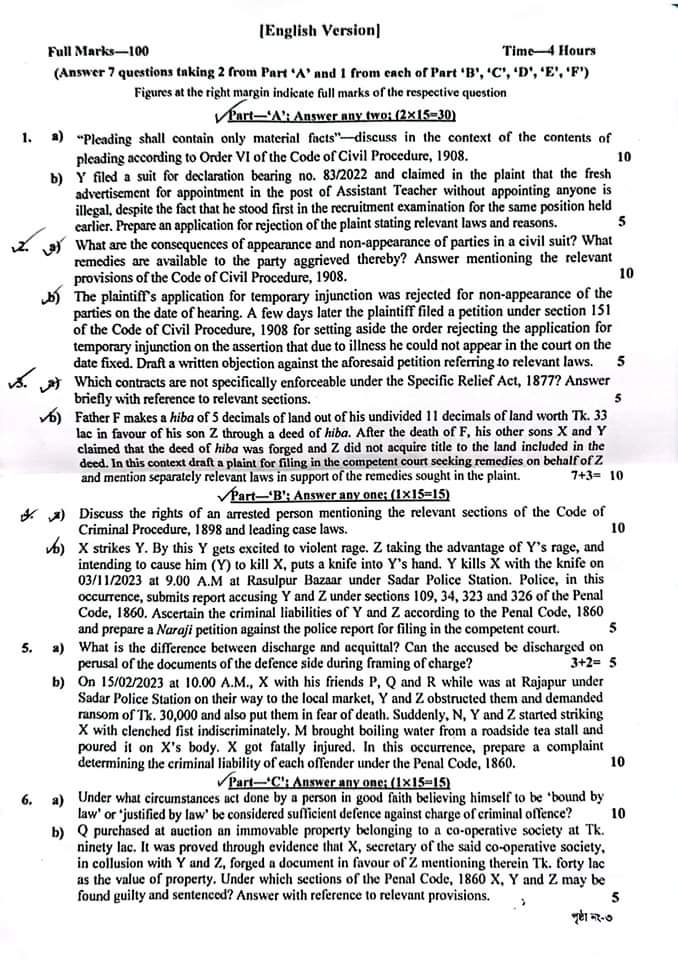Contract of Sale of goods; Sale of goods act, 1930
Introduction: Laws relating to Sale of goods in Bangladesh are contained in the Sale of Goods Act, 1930, which came into force on 1st July, 1930. It came out from the Contract Act as an independent and separate law. This Act contains sixty-six Sections and applies to the whole Bangladesh. It is based mainly on the English Act and incorporates many of its provisions. This Act is applicable in the transfer of movable property. The transaction relating to immovable properties, e.g., the sale, lease, gifts, etc., are governed by a separate Act known as ‘The Transfer of Property Act, 1882’. But some principles of transferring property contained in the Act of 1882 shall be applicable in transferring movable property too. These matters are going to be clarified in this write-up.
Meaning of Contract of Sale of Goods: According to section 4 of
the sale of goods Act, 1930:
“A contract whereby the
seller transfers or agrees to transfer the property in goods to the buyer for a
price is a contract of sale of goods.”
Contract of sale may be
absolute or conditional. In an absolute sale, the property in goods passes from
the seller to the buyer immediately and nothing remains to be done by the seller.
The term “Contract of Sale‟ is a general term and comprises of: “Sale‟ and
“Agreement to Sell”.
Where the seller transfers
the property in the goods immediately to the Buyer, the contract is called a
sale. On the other hand, where the transfer of property in the goods is to take
place at a future time or subject to some condition thereafter to be fulfilled,
the contract is called an agreement to sell.
Essential Elements of a Contract of Sale of Goods (section
4): Above definition of ‘the contract of sale of goods’ stipulates the
following elements-
1. The first essential is that there must be two distinct parties to a Contract of Sale, i.e., a buyer and a seller, as a person cannot buy his own goods.
2. The term “property”, as used in the Sale of Goods Act, means “general
property” in goods as distinguished from “special property.
3. Goods mean every kinds of movable property other than actionable claims
and money.
4. The consideration for a contract of sale must be money consideration
called the “Price”.
5. The term „Contract of Sale‟ is a generic term and includes both a „Sale‟
and an „Agreement to Sell‟.
6. The Sale of Goods Act does not prescribe any particular from to constitute a valid contract of sale.
Difference between Sale and Agreement to Sell:
|
Sale |
Agreement to
Sell |
|
•
Ownership
is immediately transferred to buyer immediately. •
It is
executed contract. •
Seller
can use for price, if the buyer does not pay the price. •
Risk
passes to buyer •
Buyer
can get goods even if seller becomes insolvent. •
Delivery
of sold property to receiver if buyer becomes insolvent before the payment of
price |
•
Ownership
remains with the seller •
It is
an executory contract •
Seller
can sue for damages •
Risk
doesn’t passes to buyer •
Buyer
can get proportionate share in money but can’t get goods • Delivery of sold property can be refused by seller if buyer becomes insolvent. |
Conditions and Warranties: Sec
(12-13):
Generally, at the time of sale, the seller makes
some representation, statements of stipulations for the praise of his goods.
Some of representations are in nature of opinion others are in nature of facts.
Representation as to fact which becomes a part of contract of sale is called as
stipulation.
Stipulation may be condition or warranty depending on
its importance in relation to contract. Stipulation which is essential to
the main purpose of contract is known as condition. (Section 12) Breach
of condition gives the aggrieved party right to terminate the contract. But stipulation
which is collateral to the main purpose of the contract is warranty. Breach
of warranty gives rise to the aggrieved party right to claim damages but
contract cannot be terminated. (Section 12)
The conditions and warranties may be express or implied.
Implied Conditions:
q CondiTions as to title – sec 14(a): There is an implied
condition on the part of the seller that in the case of sale, the seller has
the right to sell the goods which are intended to be sold. And, the purchaser
may presume that the seller has title to the said property. In such case, the
seller cannot deny the sale subsequently because of defective title. In the agreement to sell, the seller will have
the right to sell the goods at the time of passing of its ownership.
q Conditions as to description – Sec 15: Where the goods are sold
by description, there is an implied condition that the goods shall correspond
to the description.
Example: The
seller sold a machine describing it as a new one, though the buyer has not seen
the machine. However, it was found to be a very old one. Held, the machine was
not according to the description.
q Sale by sample – Sec 17: Where the goods are sold
by sample, the goods must resemble to the sample. In such cases, the buyer
shall be given a reasonable opportunity to compare the goods with the sample.
q Sale by description as well as sample – Sec 15: If any product is sold by
sample as well as description, both conditions shall be satisfied. Goods must
correspond with sample as well as description.
Example: A agreed to sell to C some oil described as “Foreign refined oil” and warranted only equal to sample. The goods supplied were equal to sample, but contained a mixture to oil. Held, C could reject the goods.
q Conditions as to quality and fitness for buyer’s
purpose – Sec 16: Where the buyer, expressly or impliedly, tells the seller the particular
purpose for which he needs the goods and relies on the skill or judgment of the
seller, there is an implied condition that the goods shall be reasonably fit
for such purpose.
Example: A
purchased a hot water bottle from a chemist. While the bottle was being used by
A’s wife, it burst and injured A’s wife. Held, the seller was liable for
damages as the bottle was not fit for the purpose for which it was meant – Priest vs Last.
q Exceptions to the implied condition as to quality or
fitness: The condition as to quality or fitness’ well not apply, if the buyer
suffers from an abnormality, which renders the goods unsuitable for a
particular purpose and the buyer does not inform the seller about that
abnormally.
Example: A purchased a coat. He had abnormally sensitive skin. By wearing the coat, he got skin complaint. Held, there was no breach of condition, as he had not disclosed the abnormally of his skin.
q Conditions as to merchantability: Where goods are bought
by description from a seller, who deals in goods of that description,
there is an implied condition that the goods shall be of merchantable quality.
‘Merchantability’ means that there is no defect in the goods, which renders
them unfit for sale. Thus, the buyer shall presume while buying a pen that the
pen that will write otherwise it cannot be regarded as merchantable.
Example: A radio
set was sold to a layman. The set was defective. It did not work in spite of
repairs, Held, the buyer could return the set and claim refund.
q Condition as to wholesomeness: In the case of eatable
and food – stuff, there is an implied condition that the
goods shall be wholesomeness, i.e., free from any defect which renders them unfit
for human consumption.
Example: A Purchased some milk from B, a milk dealer. The milk contained typhoid germs. A’s wife on taking the milk got infected and died. Held, A was entitled to get damages – Frost vs Aylesbury Dairy Co. Ltd.
Implied
Warranties:
q Warranty as to quiet possession – Sec 14: In the absence to any
contract showing contrary intention, there is an implied warranty that the buyer
shall have and enjoy quiet possession of the goods. If the buyer is
disturbed in the enjoyment of the goods, he can claim damages from the seller.
q Warranty against encumbrances – Sec 14: Unless the circumstances
of the case are such as to show a contrary intention, there is an implied
warranty that the goods shall be free from any charge or encumbrance in
favour of any party not declared to the buyer before or at the time contract is
made. However, there will not be any such warranty if charge is declared to
buyer at the time of sale.
q Warranty as to quality and fitness by usage of Trade
– Sec 16: An implied warranty as to quality or fitness for a particular purpose may
be annexed by the usage of trade.
q Warranty to disclose the dangerous nature of goods: In case of sale of
dangerous goods, the seller is under an obligations to warn the buyer
about the probable danger. Failure to do so will make the seller liable
to pay damages.
Example : A sold a tin of disinfectant to B, knowing that it was likely to be dangerous to the tin, whereupon disinfectant powder went into her eyes, causing her injury. Held, A was liable in damages to B, as he failed to warn B of the probable danger.
Difference
between Condition and Warranty:
|
Condition |
Warranty |
|
•
Essential
to main purpose of contract. •
Buyer
has right to cancel contract. •
Breach
of condition may be treated as breach of warranty. |
•
Collateral
(subsidiary) to main purpose of contract. •
Buyer
has no right to cancel the contract. •
Damages
can be claimed in case of the breach of warranty. •
Breach
of warranty can’t be treated as breach of condition . |
When
condition to be treated as warranty: Breach of condition may be treated as breach of
warranty in cases of Voluntary Waivers i.e. where the buyer voluntarily
waives the condition and claims damages only. Section 13(1) provides that “where
a contract of sale is subject to any condition to be fulfilled by the seller,
the buyer may waive the condition or elect to treat the breach of the condition
as a breach of warranty and not as a ground for treating the contract as
repudiated.”
Example: An agreement of sale is made between a buyer and
seller that certain product will be delivered on May 1st. But in
reality the product was delivered to the buyer on May 2nd. Here the
buyer instead of cancelling the contract may claim damage against the seller
for any damage irregularity done to the buyer for not delivering him the
product on time






